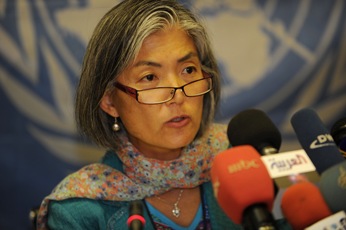UN official “heartbroken” over suffering in South Sudan
November 21, 2014 (JUBA) – The United Nations assistant secretary-general for humanitarian affairs on Friday described as “heartbreaking” the level of violence witnessed during 11 months of conflict in South Sudan.

“The level of violence experienced by civilians in South Sudan has been devastating” said Kang.
“I am heartbroken to see that the promising young country is greatly suffering,” she added.
Tens of thousands of people have been killed and nearly two million others displaced since violence broke out in the country between the army and armed rebel groups.
Kang said humanitarian agencies were doing everything possible to help South Sudanese, but the sole responsibility to avert famine in 2015 lies with the leaders.
“However much we scale up our operations, we will never be able to do enough if the conflict continues to destroy lives and livelihoods. All parties to the conflict must show leadership and bring peace to this country,” said the senior UN official.
“The year-long conflict has been brutal. Civilians have been killed, raped and beaten; homes torched; lives ruined. Fighting has destroyed communities and separated families,” she added.
Currently, over 100,000 people have sought refuge at UN bases. Millions more reportedly fled into bushes and were still too fearful to return home or settle elsewhere.
However, despite the extremely difficult situation for aid workers who face active hostilities, access and logistical challenges, as well as threats to their own lives, UN humanitarian agencies and partners have reportedly reached more than 3.5 million people with assistance this year, helped avert famine, and brought under control a deadly cholera outbreak.
The situation remains bleak and the number of people who are severely food insecure is projected to increase to 2.5 million people in early 2015. Aid agencies are planning for next year and are urgently calling for $600m to kick-start next year’s operations.
“In the dry season, we need to pre-position life-saving and livelihood supplies to reach all people in need, and carry out key repairs to roads and airstrips so that we can scale up and expand the aid operation,” said Kang.
Kang also visited communities affected by the crisis in Juba and Jonglei state.
She also met with government representatives and humanitarian partners to discuss ways of improving access and strengthening protection of civilians, but urged conflicting parties to respect international humanitarian and human rights laws.
(ST)
